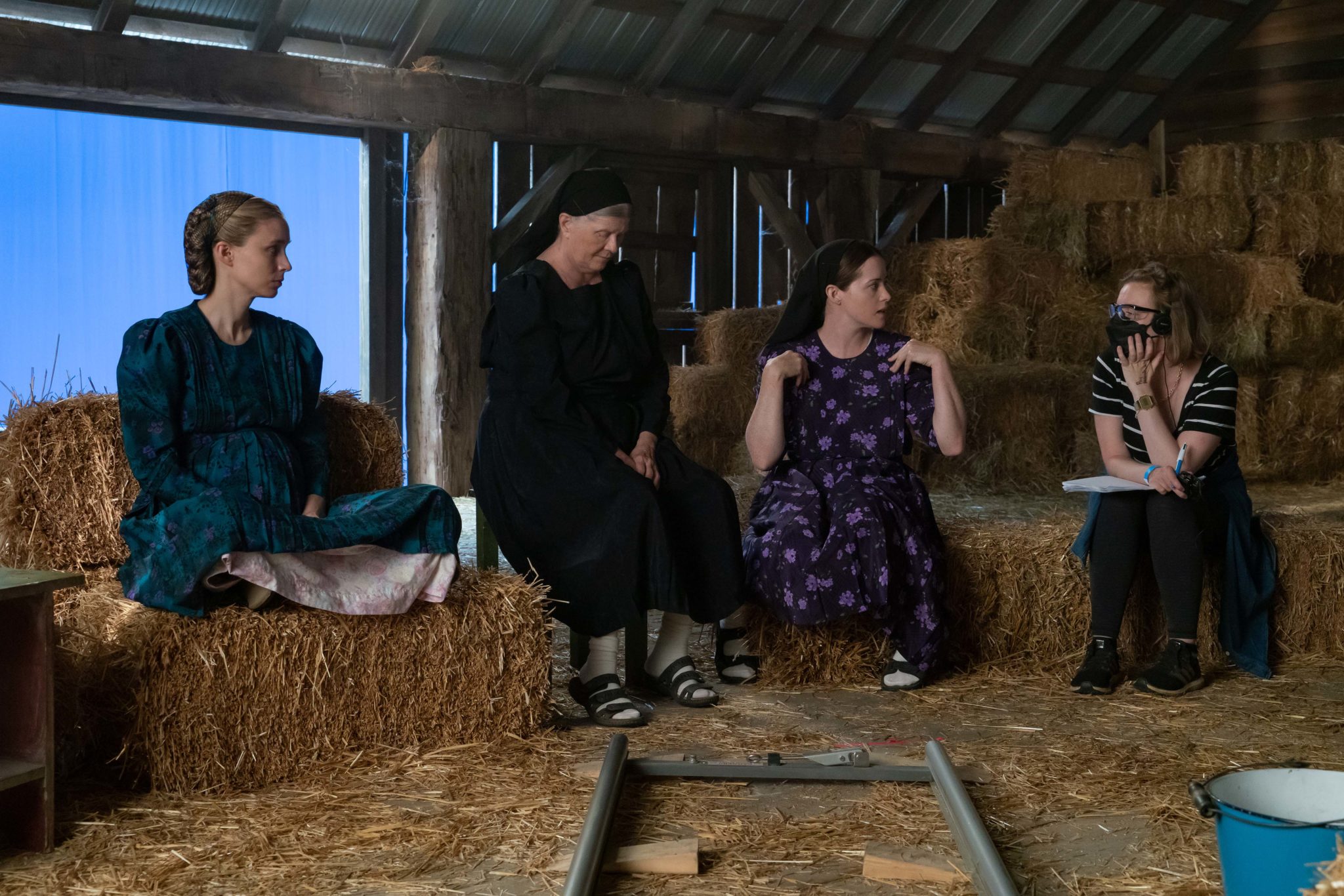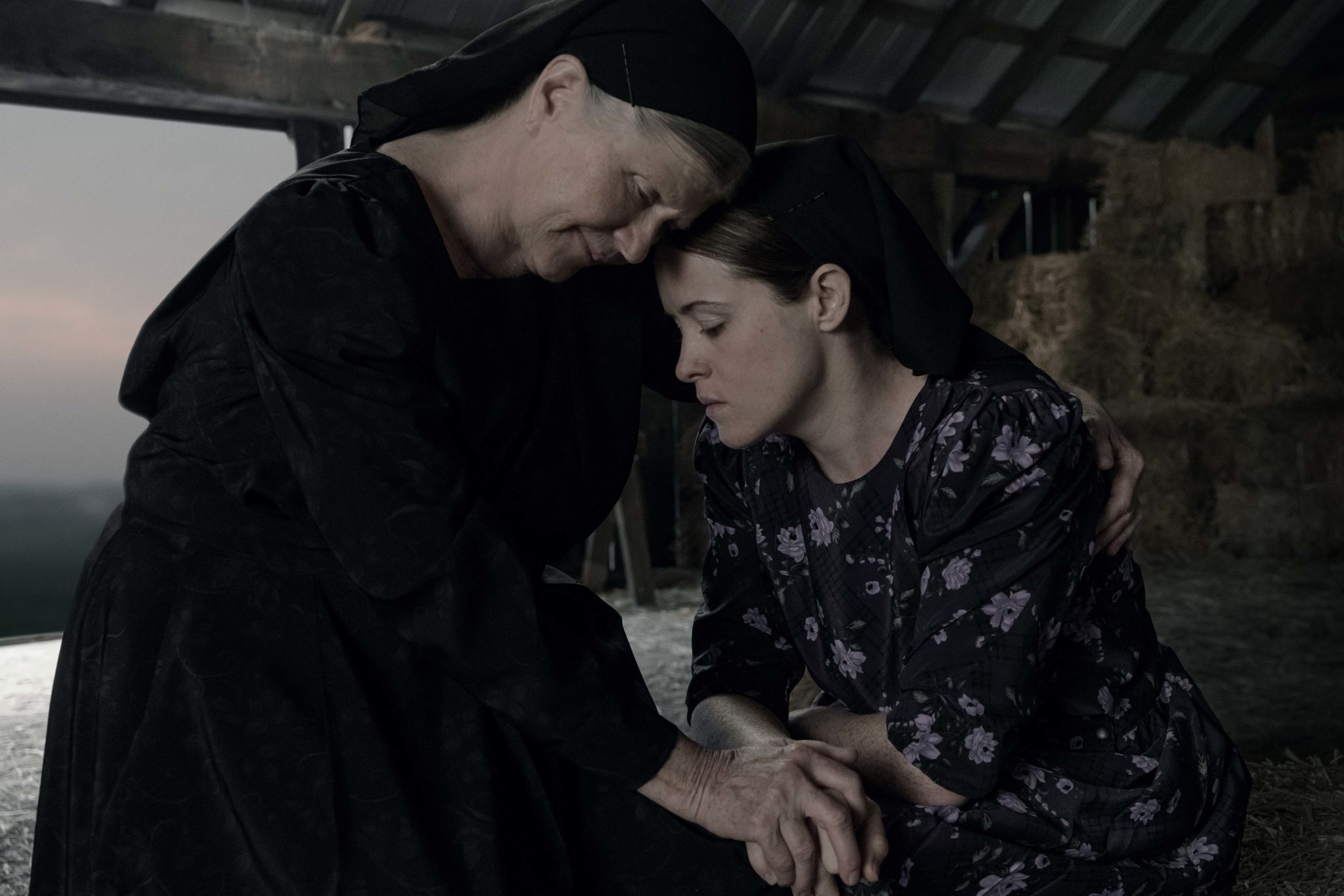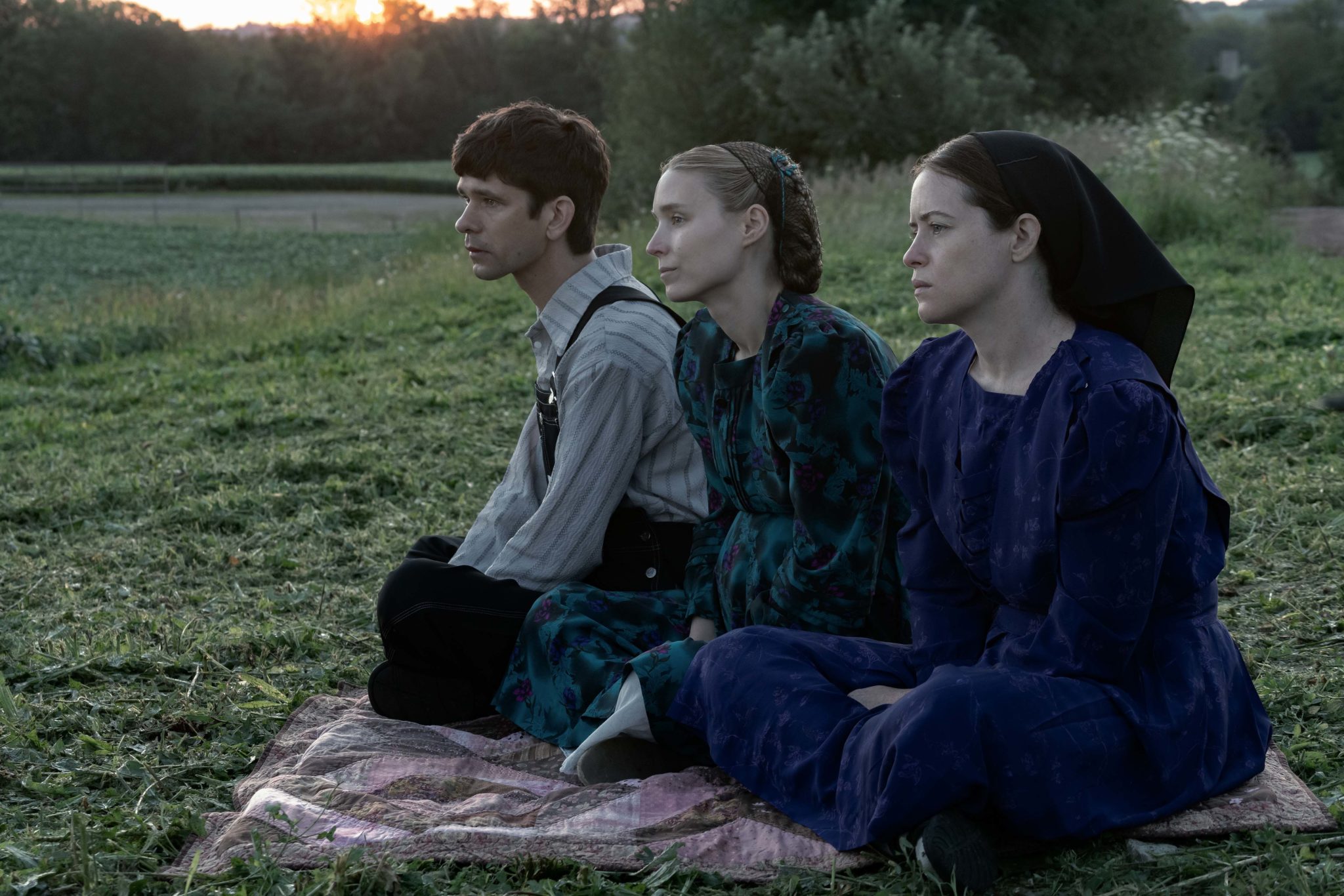- Film And TV
- 10 Feb 23
Claire Foy on Women Talking: "This dynamic on set is nothing like I’ve ever experienced... I’m 38 and this is the first film I’ve made which has felt like that"

The Crown star Claire Foy discusses her role in Sarah Polley’s stunning new drama Women Talking, in which a group of Mennonite women look to heal from trauma and violence.
Having been introduced to the Canadian author Miriam Toews a few years ago, her 2018 novel hit me in a way that way few books do. Loosely based on real events that occurred at the Manitoba colony in Bolivia, Women Talking tells the story of eight Mennonite women who hold a meeting to discuss what to do in the aftermath of an unimaginable horror.
The women learn that the men in their colony have been drugging them at night, sexually assaulting them, then gaslighting the women to make them believe they were imagining things or being possessed. The women are religious, uneducated and cannot read or write, and thus ask a male school teacher to transcribe the minutes of their meeting so that there is a record of what happened to them, and how they decided to react.
The book plays out in an incredible dialogue, as the women navigate philosophical and religious discussions about faith and forgiveness; practical concerns such as their safety and ability to survive; and the complex relationships they have with each other and the men in their lives – their husbands, their sons, their attackers, and the men who exist across categories.
The book is an incredible piece of work – and so needed an incredible director with vision, emotional intelligence and an understanding of how to tackle complex subject matter responsibly. Enter Sarah Polley, the director of Away From Her, Take This Waltz and the beautiful documentary The Stories We Tell. Polley’s sublime 2022 essay collection, Run Towards The Danger, is an incredible exploration of gender, pain and performance, detailing not only the dangers she experienced as a child actor working with Terry Gilliam on The Adventures Of Baron, but also her experience of sexual assault, and the ways society continues to police and punish women more for their reactions to sexual violence than the violence itself.
Polley’s direction of Women Talking is as thoughtful, intricate and beautiful as any of her other work. She has also assembled a superb cast to play the women at the heart of the story, including Rooney Mara, Jessie Buckley, Frances McDormand and Claire Foy. Foy plays Salome whose young daughter is assaulted by the men, and is hellbent on revenge by whatever means possible. As ever, Foy delivers a magnificent performance.

(l-r) Actors Rooney Mara, Judith Ivey, Claire Foy and director Sarah Polley
on the set of Women Talking. Photo credit: Michael Gibson
Salome’s rage, maternal love, tenderness and ferocity vibrates off the screen, her emotions highlighted by the more calm, philosophical approach taken by some of the other characters. I have long said that Foy was robbed of an Oscar nomination for her portrayal of Neil Armstrong’s wife Janet Shearon in Damien Chazelle’s First Man, and she is also known for her portrayal of Queen Elizabeth II in The Crown; Anne Boleyn in Wolf Hall; and Margaret Campbell in A Very British Scandal.
There seems to be a throughline in Foy’s work of playing women who are trying to reclaim their power in a world of men, and over Zoom I ask Foy, now 38, if that is a deliberate choice.
“You know, maybe the universe is trying to tell me something!” she laughs, sitting cross-legged on a couch in a cream trouser suit. “I think it’s six of one, half-a-dozen of the other. People send you things because they think you might be right for it, and maybe because I’ve done things like that, perhaps that’s the case. But also, I just think that to tell female stories, you’re going to have to tell stories in which women are moving in a world which is made by men.
“What I love about Women Talking is that even though that’s the backdrop, that is actually not the story. Women have obviously been the survivors of these attacks in a male world, and they are living in the patriarchal society that their colony has created. But in our story, that’s not where you see them – you see them in a world of their own making. They’re talking the same language as each other, the relationships they’re having on the screen are with each other. That closeness, and the way that they articulate themselves, and how physical they are with each other, is what you see. That’s really important.”
Foy said Miriam Toews’ book was “extraordinary, just unlike anything I’ve ever read. It was almost supernatural in the way you’re transported to a completely different world”, and reveals that she was immediately drawn to the character of Salome, but wasn’t sure she was going to be given the role.
“I think I was originally asked to read for On” – a quiet, contemplative role eventually given to Rooney Mara – “which looking back is utterly ridiculous!” laughs Foy. “But Sarah asked me who I actually felt most drawn to, and fortunately she let me read for Salome, because I was completely myopic with my belief in her and my love for her. Her faith is incredibly important to her. I think the question she asks of God in the film, and the questions she asks out of religion, are not the same as her faith.
“Her faith is steadfast, she’d do anything for anybody, and she has a huge heart. She’s very forceful and rageful; she’s big, she’s loud and she makes her presence felt. Her emotions are the only emotions in the room. She’s completely loved anyway – it’s okay for her to have these big rages, she simmers down. And then she communicates and offers something to the conversation.”

Judith Ivey as Agata and Claire Foy as Salome. Photo credit: Michael Gibson
It’s a quality Foy admires in Salome.
“I love that depiction of someone, especially of a woman,” she continues, “because no-one needs to take it personally. They’re her reactions and they’re completely justified, and she’s allowed to have them. It’s a real testament to the group of women that they allow her to be herself. I have on occasion had it thrown at me that I’m too emotional – and it’s okay. Things are emotional. Life is emotional.
“It’s better to feel it than not, I think. I don’t know whether any other director would have given me that opportunity to read for Salome, just because I wanted to. But that’s Sarah – she’s kind and generous and really collaborative.”
Polley’s desire to let Foy pick the character that spoke to her the most is illustrative of the director’s collaborative style. The cast had intensive conversations with each other about their own experiences of sexism and violence, which not only fed into their understanding of the characters’ struggles, but helped create the extraordinary onscreen intimacy.
What feels important about the film and its source material is that, while witnessing physical and sexual violence against women onscreen is now depressingly routine, it’s still rare that we get to see the aftermath; women’s processing, pain and attempts to heal.
“That’s amazing you’ve noted that, because that’s basically Sarah’s objective,” nods Foy. “To not try and fetishise the attacks themselves, but ask the questions of what happens to a human being after they’ve survived such an assault? That’s what the film tries to address. The atmosphere wasn’t just created between the cast – we can’t discount the fact that there was a large crew. This is why Sarah is so incredible; she oversaw everything and knew the significance, so there was a therapist on set for everybody, the cast and crew.
“When you consider the conversation we’re having in the film, but also some of the things we as actresses have actually depicted onscreen, where no one’s ever asked if we’re okay, psychologically, after having to do things that are really, really traumatic…” Foy trails off, shaking her head. “So Sarah’s philosophy was a real reassurance, I think, for a lot of people. And the therapist gave a lot of people a lot of help.
“This dynamic on set is nothing like I’ve ever experienced – which is upsetting in a way, that I’m 38 and this is the first film I’ve made which has felt like that. But I just hope there are more directors made in her likeness. She’s just extraordinary.”
Foy remarks that the conversations and workshops held between the actresses were remarkable and moving – and always felt carefully handled.
“It had to be a space in which we could either share, or not share,” she reflects, “but still have the feelings and the thoughts, and everyone was still there. At the end of it, we all inherently understood the reality of what our characters had been through. And yeah, there were obviously really dark, bleak moments for everyone at some point.”

(l-r) Ben Whishaw as August, Rooney Mara as Ona and Claire Foy as Salome. Photo credit: Michael Gibson
The opening line of the film, taken from Miriam Toews’ author’s note, states that Women Talking is “an act of female imagination”. This refers to the fictionalising of a real event, but the questions the characters pose to each other are also the questions audiences will be left with: What can we imagine about the world around us? What can we build, instead of just destroying? How do we get there? These questions feel particularly prescient given the conversation around #MeToo, and I ask Foy what she imagines for the future and whether she is hopeful.
“What this film does offer is a lot of hope,” she replies. “If more people were asked about the world they want to create, in which they were an equal participant in that society – and that’s not just talking about women, what Sarah did so beautifully was making this applicable to all marginalised groups in different parts of the world – but asking what would it be like if you got to dictate the terms of the world that you lived in? We’d be in a better place.
“What’s extraordinary about these women is they want to make creative community based on love, in a really non-trite way. Love for your other human beings and leading with that, as opposed to division and polarisation. The idea that it can be inclusive for all.”
Foy pauses in thought, then shrugs slightly.
“It depends on the day you find me,” she admits. “The fact this film has been made makes me incredibly proud and hopeful. I don’t think it would have been made 10 years ago, because people didn’t believe that a film could exist in the female realm. It’s been dictated by lots of other people for such a long time. The appetite to see a film like this, which asks questions, starts challenging conversation, engages with the audience, and also hopefully entertains them as well is, I think, really special.
“But yeah, it depends on the day. Today, I’m relatively depressed about the world we live in. But hopefully, give me a couple of days and I might feel more buoyant. Social media and all that sort of stuff is not the way the world’s going to be healed.”
I ask her whether her sense of hopelessness on the day we’re speaking is based on anything in particular, or whether it comes in waves.
“No, it’s just having lots of conversations with people about the film,” she says. “Like, everyone is so engaged because it’s extraordinary, and I’m having conversations I never would have about any other project I’ve ever done before. But then also, just like you said, it makes you think about the world we live in, and it’s a constant reminder that it’s not going in particularly great directions. What is really important is getting the film in schools, getting it in colleges. Having that generation of people talking is really important.”
• Women Talking is in cinemas now.
RELATED

- Film And TV
- 13 Mar 24
Roman Polanski faces civil trial in US next year

- Film And TV
- 18 Sep 23
Broadcasters investigating sexual assault accusations made against Russell Brand
RELATED

- Film And TV
- 23 May 22
Rebel Wilson opens up about experience of sexual harassment by male co-star

- Film And TV
- 12 Apr 22
Johnny Depp defamation lawsuit case against Amber Heard begins in Virginia

- Lifestyle & Sports
- 02 Jul 21
Twitter reacts to Bill Cosby's overturned conviction

- Film And TV
- 29 Jun 21




